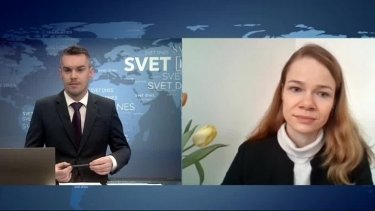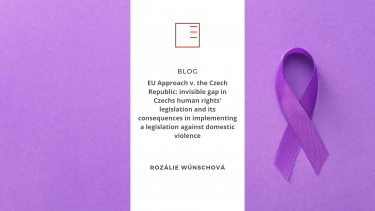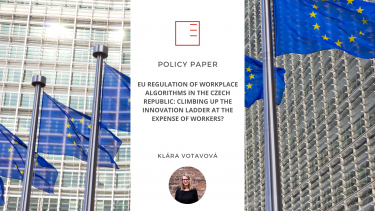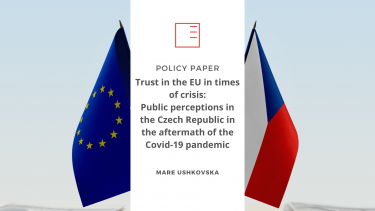POLICY PAPER | Shifting the gender quota debate from underrepresentation of women to overrepresentation of men within diplomacy
Ivana Uličná writes about the fact that even though some progress has been made towards gender equality in diplomacy, women remain underrepresented in ambassadorial positions worldwide. Quotas have been effective in boosting nominal representation of women but critiques focused on quotas being tokenistic and harming meritocracy place a double burden on women. However, even the current system is not meritocratic, as men benefit from a historical advantage and assumed competence, while women must justify their presence, prove their worth and disprove gender stereotypes.
Show moreTA3: The EU as a whole does not act on the issue of arms supplies to Ukraine, it is a decision of the member states
Zuzana Stuchlíková, our research associate, commented for TA3 on Ukrainian President Volodymyr Zelenskyj’s summit at the European Union.
Show more
BLOG: EU Approach v. the Czech Republic: invisible gap in Czechs human rights' legislation
Rozálie Wünschová writes in her blog that the Czech Republic is one of only two EU countries where corporal punishment of children is still legally permitted. Together with Slovakia, this puts the Czech Republic behind not only the Nordic countries, where corporal punishment was banned in the last century but also countries such as Turkmenistan, which adopted protective legislation in 2007.
Show more PDFSUMMARY OF EXPERIENCES WITH THE INVOLVEMENT OF CSOS IN V4 IN THE DECARBONISATION PROCESS
The project is focused on the examination of the role of non-governmental organizations in the process of decarbonization of coal regions in V4 countries (Czech Republic, Hungary, Poland, Slovakia). The aim of the project is to describe the best and worst practices of the individual processes for Serbia, who awaits the transformation of its energy mix, largely based on coal. The examined V4 countries have had a slightly different share of coal in their energy mix, while the largest one being in Poland and the second largest one in the Czech Republic, followed by Hungary and Slovakia. There are many similarities and differences in their takes on decarbonisation, thus providing different range of experiences.
Show more PDF

POLICY PAPER | EU Platform workers‘ directive: A test for regulating the future of work
A policy paper by our research intern Silke Maes entitled "EU Platform workers' directive: A test for regulating the future of work" takes a closer look at the aforementioned Directive on improving working conditions at work through platforms. The paper details the impact of the development of platforms on working conditions and then argues that the Directive is the first EU attempt to respond to this development.
Show morePolicy Paper | EU Regulation of Workplace Algorithms in the Czech Republic: Climbing up the Innovation Ladder at the Expense of Workers?
Our researcher Klára Votavová has written a policy paper in which she discusses the new dilemmas concerning the balance of competitiveness and decent work standards in the Czech Republic, which are emerging with advancing digitalization and automation.
Show more PDFČT24: The election result sends a signal about the pro-Western direction of the Czech Republic
The head of our Brussels office, Žiga Faktor, appeared on Czech Television to comment on the reaction of Brussels to the results of the presidential elections. He also mentioned the role of the president in relation to the EU and NATO and how this relationship will change after two terms of Miloš Zeman.
Show more
Policy Paper | Trust in the EU in times of crisis: Public perceptions in the Czech Republic in the aftermath of the Covid-19 pandemic
How has the Covid-19 pandemic affected the Czechs' relationship with the European Union? This topic is addressed in a policy paper by visiting fellow Mare Ushkovska.
Show moreBLOG | “A Close Neighbor Is Better Than a Distant Relative” - Belt and Road Initiative: Are We Closer After 10 Years?
In 2013, the Chinese president introduced the New Silk Road project, also known as the Belt and Road Initiative. It was to connect China with countries in Central Asia, the Middle East, Europe and maritime regions with the purpose to coordinate policies and link infrastructure. However, the initiative, and especially China's role in it, raises many questions and doubts. What is its future? This is what our intern Šárka Váchalová discusses in her blog.
Show moreINVITATION | EU-Pacific Talks: Europe and the Indo-Pacific: Migration and demographic changes
We would like to invite you to a debate "EU-Pacific Talks: Europe and the Indo-Pacific: Migration and demographic changes", which will take place on 30 January at 13:00 online on our Facebook page.
Show more
Staroměstské náměstí 4/1
Prague 1 - Staré Město
110 00
tel.: +420 212 246 552
email: europeum@europeum.org
https://www.europeum.org









